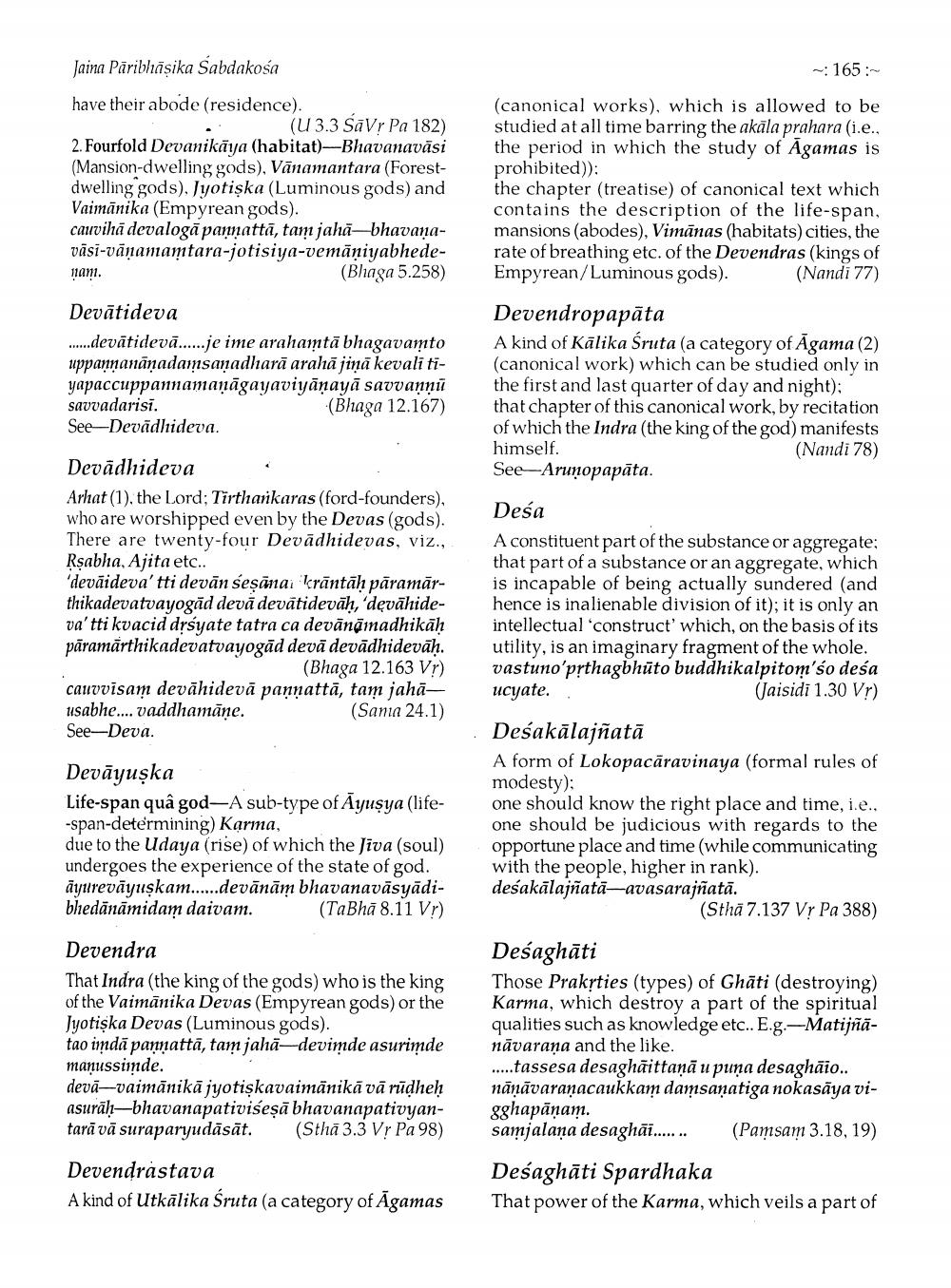________________
Jaina Pärilläsika Sabdakosa
have their abode (residence).
(U3.3 SaVr Pa 182) 2. Fourfold Devanikaya (habitat)-Bhavanavāsi (Mansion-dwelling gods), Vanamantara (Forestdwelling gods). Jyotiska (Luminous gods) and Vaimanika (Empyrean gods). cavila devaloga pamatta, tam jaha-bhavanavāsi-vāṇamamtara-jotisiya-vemāṇiyabhede
(Bhaga 5.258)
nam.
Devätideva
.....devatideva....je ime arahamta bhagavanto uppanmananadamsaṇadhara araha jina kevali tiyapaccuppannamaṇāgayaviyāṇayā savvanṇā (Bhaga 12.167)
savvadarisi. See-Devadhideva.
Devadhideva
Arhat (1), the Lord; Tirthankaras (ford-founders). who are worshipped even by the Devas (gods). There are twenty-four Devadhidevas, viz... Rsabha. Ajita etc..
'deväideva' tti devan seṣāna kräntäḥ päramär thikadevatvayogaād devā devātidevāḥ, 'devāhideva'tti kvacid dṛśyate tatra ca devānāmadhikāḥ pāramārthikadevatvayogäd devā devādhidevāḥ. (Bhaga 12.163 Vr) cauvvisam devahidevā paņṇattā, tam jahāusabhe.... vaddhamane. (Samia 24.1) See-Deva.
Devayuska
Life-span quâ god-A sub-type of Ayuşya (life-span-determining) Karma,
due to the Udaya (rise) of which the Jiva (soul) undergoes the experience of the state of god. ayurevayuṣkam.......devānām bhavanavāsyādibhedānāmidam daivam. (TaBha 8.11 Vr)
Devendra
That Indra (the king of the gods) who is the king of the Vaimanika Devas (Empyrean gods) or the Jyotiska Devas (Luminous gods).
tao indā pamatta, tam jahā-devimde asurimde manussimde.
deva-vaimanikä jyotişkavaimänikā vā rūḍheḥ asurah-bhavanapativiseṣa bhavanapativyantani va suraparyudäsät. (Stha 3.3 Vr Pa 98)
Devendrastava
A kind of Utkälika Śruta (a category of Agamas
~165~
(canonical works), which is allowed to be studied at all time barring the akäla prahara ().e.. the period in which the study of Agamas is prohibited)):
the chapter (treatise) of canonical text which contains the description of the life-span. mansions (abodes), Vimänas (habitats) cities, the rate of breathing etc. of the Devendras (kings of Empyrean/Luminous gods). (Nandi 77)
Devendropapäta
A kind of Kalika Śruta (a category of Agama (2) (canonical work) which can be studied only in the first and last quarter of day and night): that chapter of this canonical work, by recitation of which the Indra (the king of the god) manifests himself. (Nandi 78)
See-Arumopapāta.
Desa
A constituent part of the substance or aggregate: that part of a substance or an aggregate, which is incapable of being actually sundered (and) hence is inalienable division of it); it is only an intellectual 'construct' which, on the basis of its utility, is an imaginary fragment of the whole. vastuno'pṛthagbhūto buddhikalpitom'so desa (Jaisid 1.30 Vr)
ucyate.
Deśakālajñatā
A form of Lokopacāravinaya (formal rules of modesty):
one should know the right place and time, i.e.. one should be judicious with regards to the opportune place and time (while communicating with the people, higher in rank). deśakālajñatā avasarajñatā.
(Stha 7.137 Vr Pa 388)
Deśaghati
Those Prakrties (types) of Ghati (destroying) Karma, which destroy a part of the spiritual qualities such as knowledge etc.. E.g.-Matijñānavarana and the like.
.....tassesa desaghaittana u puna desaghaio.. nāṇāvaraṇacaukkam damsanatiga nokasaya vigghapānam.
samjalana desaghai........
(Pamsam 3.18, 19)
Desaghati Spardhaka
That power of the Karma, which veils a part of




